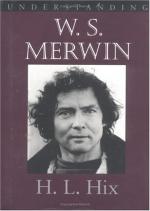|
This section contains 718 words (approx. 3 pages at 300 words per page) |

|
The journey implied in [the titles of Merwin's Houses and Travellers and The Compass Flower], the journey of life, if you will, occurs time and time again. But it is always full of surprises. In one story a pebble stops for the night, looks up, and then "deep in the stone the first moon rises." In another a reaper discovers a young woman "lying on the ground like a sheaf of wheat, radiant and silent."
Like medieval writers Merwin sees the journey primarily in moral terms. Encounters take on moral values depending upon whether they help or hinder the traveller. People become types rather than individuals; things become symbolic. But while medieval people saw heaven as the end of their journey, we have no such consolation. Our goals remain elusive, mysterious. Thus Merwin's narratives border on allegories to which the key has been lost. One feels more meaning...
|
This section contains 718 words (approx. 3 pages at 300 words per page) |

|


